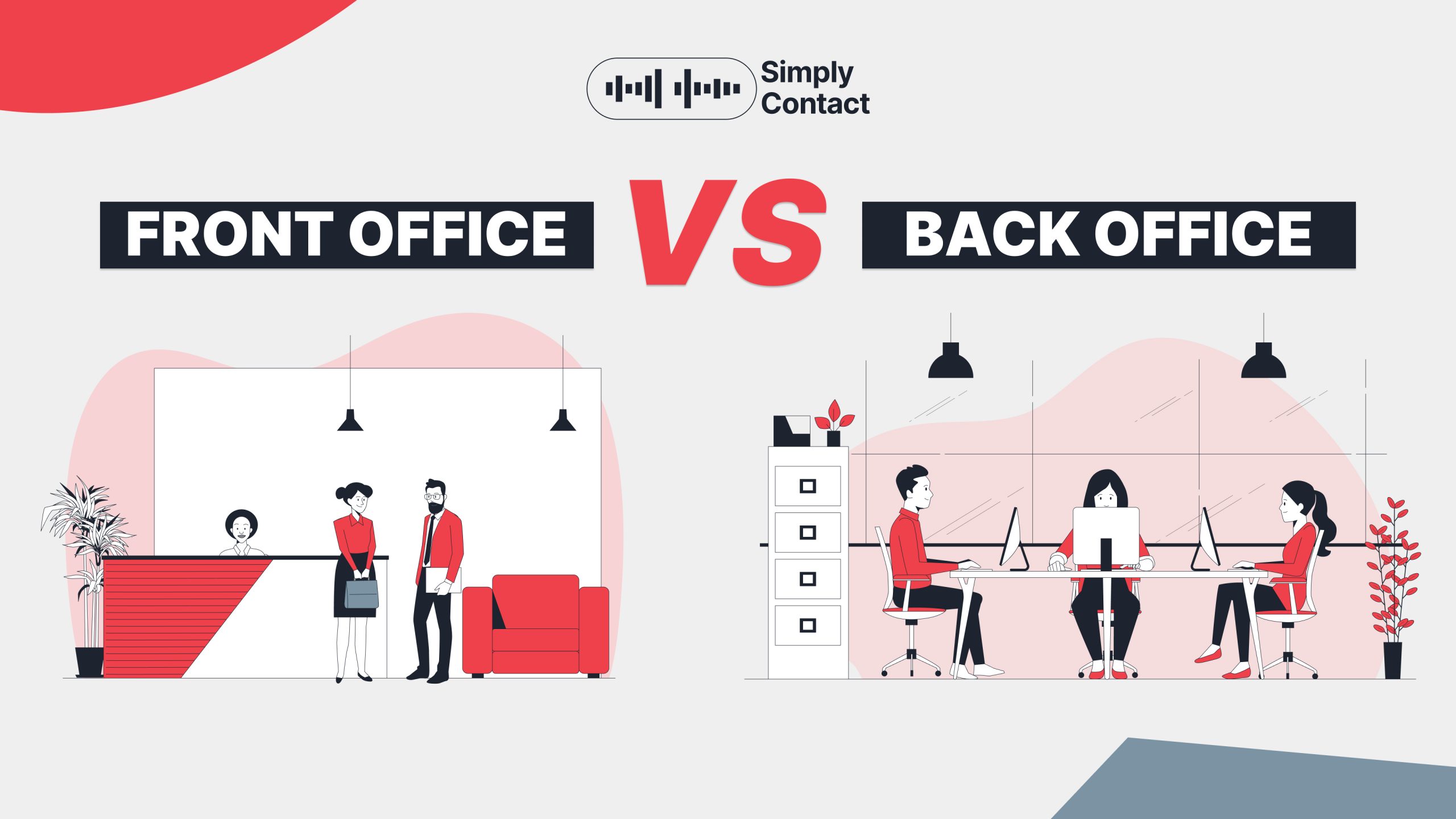At Simply Contact, we specialize in creating personalized customer support solutions that drive business growth and customer satisfaction. Let us help you elevate your customer experience and stand out from the competition.

Front Office vs. Back Office: What’s the Difference?
Every organization runs on two essential engines: the front office and the back office. One shapes the customer experience, while the other powers everything behind the scenes. Alone, they’re strong—but together, they’re unstoppable. In this article, we’ll explore what makes each function unique, how they work together, and why getting this balance right is crucial for lasting success.
Front office vs. back office: An overview
The front office and back office represent distinct facets of an organization, each with a unique focus, skills, and responsibilities. Let's explore what is front office and back office meaning.
What is front office?
The front office serves as the public face of an organization, handling roles related to client interactions, sales, and customer service. It’s where customer relationships are built, deals are secured, and revenue takes shape.
Some key points about front office
Front office employees are visitors' first point of contact, making them essential to shaping customer satisfaction, impression, and loyalty. Their focus on delivering positive customer experiences has a direct impact on the company’s reputation and financial success.
However, the important thing about front office employees is that their role extends far beyond greetings. Front office teams drive marketing and sales initiatives, manage client accounts, maintain essential documents, coordinate meetings, and oversee order processing. Together, these efforts create a seamless and efficient customer journey.
Success in these roles requires strong soft skills and a welcoming attitude. Through establishing positive customer experiences, front office employees play a key role in driving company revenue and growth.
Industries like construction, education, hospitality, healthcare, and retail rely on skilled front office staff to strengthen customer interactions and boost satisfaction, highlighting their critical role in overall business performance.

What is back office?
In contrast, the back office operates behind the scenes, managing essential administrative, financial, and operational functions. While customers may never interact with the back office, it plays a vital role in ensuring the business runs smoothly. Tasks like data management, compliance, payroll, and IT support fall within its scope.
Some key points about back office
Acting as the foundation of the organization, the back office provides the tools and processes needed to support the front office’s efforts. For example, if you decide to outsource customer service, your provider can offer back-office services to keep support teams running efficiently.
The back office is the engine room of a company, responsible for behind-the-scenes work that powers seamless operations. While back office staff don't engage directly with customers, their contributions to administrative tasks, paperwork, and operational support are indispensable.
In product-based companies, a back office job means playing a key role in product development—from research and design to production—ensuring goods are created accurately and efficiently. Their support extends to the front office and other departments, making them the unsung heroes of smooth, daily business operations.
Although their work is not always visible to customers, back office employees are critical to maintaining an organized, efficient, and well-functioning business. Their behind-the-scenes contributions are essential to a company's overall success.

The front office and back office represent distinct facets of an organization, each with unique locations, skills, responsibilities, and functions. The table below summarizes the back office vs front office:
| Front office | Back office |
| Customer-facing, typically at the front of the organization. | Behind the scenes, often away from direct customer interactions. |
| Concentrated on duties that interface with clients. | Primarily responsible for administrative, operational, and support tasks. |
| Direct interaction with clients, customers, and the public. | Has minimal direct interaction with clients. |
| Aims to improve the customer experience and drive revenue. | Focuses on ensuring smooth operations and supporting other departments. |
| Highly visible to clients and the public. | Less visible to external parties; more internal-facing. |
| Commonly use CRM software, communication tools, and marketing platforms. | Employ various software tools for data tracking, reporting, and administrative functions. |
| Operate in a fast-paced, customer-centric, and dynamic environment. | Their operations tend to be more systematic and procedure-driven. |
Front office vs. back office roles in an organization
What exactly distinguishes front office roles from back office roles and how do these different functions contribute to an organization’s success? See their unique responsibilities and how they complement each other.
Front office responsibilities
Front office duties mainly involve client interactions and customer support, including:
Customer service
Front office staff aim to deliver exceptional customer service by addressing inquiries, resolving complaints, and ensuring a positive customer experience. This includes inbound call center services, chat support services, and all support activities that require real-time contact with a customer.
Marketing
Some front office teams participate in marketing activities, such as creating and executing strategies, advertising, promotions, and branding to attract and retain clients.
Public relations
Managing the company's public image and reputation is crucial. Front office teams handle public relations efforts, media relations, crisis communication, and public outreach of a company.
Call center operations
Front office employees manage incoming calls, emails, and direct client communication, addressing questions and resolving issues to ensure client satisfaction.
Record-keeping
The front office team maintains customers' records of their interactions, transactions, and other relevant data. This record-keeping helps the company in easy tracking of customers' history. Meanwhile, this shows customers that you value and care about their needs.
Client relationship management
Front office teams nurture strong client relationships by understanding their needs and ensuring their satisfaction.
Appointment scheduling
In some cases, front office teams also schedule appointments or meetings as needed.
Feedback collection
The front office team also gathers customer feedback to improve the company's products and services.
Looking for trustworthy front office support? With 11+ years of experience and 600+ skilled agents, we’re here to help!
Discover now
Back office responsibilities
Let's now dive into the various responsibilities shouldered by the back office staff:
Company’s settlements
The back office team is responsible for overseeing the company's settlements. They ensure that financial transactions are completed accurately and verify that trade agreements are upheld while facilitating the transfer of assets as necessary.
Transaction verification and accuracy
Back office staff also play a crucial role in ensuring the accuracy and completeness of paperwork associated with financial transactions. In simpler terms, they perform a final check on documents to prevent errors.
Record maintenance
The back office team keeps accurate records of all financial activities, like a detailed money diary. This record helps them in assessing past transactions.
Managing accounting tasks
Managing the organization's finances by monitoring both incoming and outgoing funds falls within the purview of the back office. It's similar to managing your personal budget to ensure you have sufficient funds for all your needs.
IT services
Taking care of the organization's computer systems and technology infrastructure is another responsibility of the back office staff. They address company IT issues, ensure seamless operations, and safeguard data.
Supply chain management
In businesses with intricate supply chains, the in-house back office team or back office BPO manages logistics, coordinates shipments, and enhances the overall efficiency of the supply chain operations.
| Front office responsibilities | Back office responsibilities |
| Customer interaction & engagement | Data entry and processing |
| Sales, marketing & lead generation | Research and analysis |
| Public relations & brand management | Record keeping & documentation |
| Customer service & problem resolution | Financial management & accounting |
| Call center & client communication | Administrative support and regulatory compliance |
| Market research & product knowledge | Quality control & assurance |
| Relationship building & client engagement | Human resources & personnel |
| Revenue generation & sales | Facility management and supply chain management |
What skills should front office and back office employees possess?
The difference between back office and front office skill requirements can vary depending on the specific company they work for. Nonetheless, there are essential skills that candidates should possess to excel in their respective departments.
The following table outlines the skills necessary for front office and back office employees to perform effectively in their roles. Additionally, it highlights some shared skills that contribute to their professional development.
| Skill category | Front office skills | Back office skills | Common skills for growth |
| Communication | Strong interpersonal skills, effective verbal and written communication | Precise written communication, teamwork and collaboration | Continuous learning, adaptability |
| Technical | Proficiency in industry-specific software/tools, data analysis skills | Data entry, software proficiency, attention to detail | Problem-solving, time management |
| Customer Service | Exceptional customer service, empathy, conflict resolution | Internal process knowledge, efficient task handling | Critical thinking, organizational skills |
| Organization | Multitasking, time management, appointment scheduling | Data organization, record keeping, process documentation | Project management, goal setting |
| Financial | Sales and revenue tracking, cash handling, financial analysis | Expense tracking, budgeting, financial reporting | Financial planning, forecasting |
Front office essential skills
Front office employees play a crucial role in direct customer interaction, requiring a unique skill set distinct from back-office roles. Here's a concise overview of their key skills:
- Communication: Front office employees should possess strong interpersonal skills and effective verbal and written communication abilities to engage with customers and colleagues.
- Technical: Proficiency in industry-specific software/tools and data analysis skills are crucial for front office roles, enabling them to handle tasks efficiently.
- Customer service: Exceptional customer service skills, empathy, and conflict resolution capabilities are vital for providing a positive experience to clients.
- Organization: Front office staff must be adept at multitasking, time management, and appointment scheduling to ensure smooth operations.
- Financial: Skills such as sales and revenue tracking, cash handling, and financial analysis are valuable for roles involving financial transactions.
Front office employees represent the organization, influencing its reputation and customer relationships. Continual skill development and training programs are valuable for staff to excel in their roles, benefiting both employees and companies alike.
Back office essential skills
The back office means serving as an operational backbone of an organization, handling tasks behind the scenes such as resource management, data management, compliance, and security. To excel in their roles, the back office team should possess the following skills:
- Communication: While still important, back office roles emphasize precise written communication, teamwork, and collaboration to support internal processes.
- Technical: Data entry, software proficiency, and meticulous attention to detail are critical for back office employees to maintain accurate records and processes.
- Customer service: While not as client-facing, back office staff benefit from understanding internal processes, which contributes to efficient task handling.
- Organization: Data organization, record keeping, and process documentation are key skills to ensure that operations run smoothly in the background.
- Financial: Back office roles often involve expense tracking, budgeting, and financial reporting, supporting the financial stability of the organization.
Companies should ensure that their back office staff possesses these skills to efficiently manage tasks such as research, analysis, project management, quality control, inventory management, IT, and technical support, depending on their specific responsibilities.

Organizations with distinct front and back offices
Many organizations, varying in type and size, are structured with both front and back office systems, each playing a crucial role in daily operations. Below, we explore various sectors where these offices are integral and outline the key responsibilities of their staff.
Organizations with front offices
Here are industries where front office roles are prominent:
Retail companies
Front office staff in retail includes sales associates, customer service representatives, and marketing teams who engage directly with customers, ensuring a smooth shopping experience.
Hospitality industry
In hotels and similar establishments, the front office consists of receptionists, concierge staff, and guest services personnel, ensuring guests' needs are met with excellence.
Financial institutions
Bank tellers, customer service representatives, and financial advisors make up the front office, assisting clients with their banking and financial inquiries.
Medical practices
Front office roles in healthcare include receptionists, nurses, and patient coordinators who manage appointments and interact with patients.
Call centers
Here, front office staff handle incoming calls, inquiries, and support requests, ensuring customer issues are addressed efficiently. In some setups, a customer support chatbot handles basic interactions, helping agents focus on more complex issues.
Organizations with back offices
Back office departments are available in various organizations. However, they particularly serve in the following areas:
Financial institutions
The back office teams in financial institutions are tasked with managing internal operations, including accounting, compliance, and IT support.
Manufacturing companies
In this sector, the back office is responsible for overseeing behind-the-scenes operations, ensuring the company runs seamlessly.
Corporate offices
Back office departments support various internal organizational functions, contributing to the company’s overall efficiency.
Data entry, processing centers, research, and analysis firms also significantly rely on back office staff. These professionals, including data analysts and report writers, play a crucial role in data management and insights derivation.
Summary
In any organization, both front and back office roles are essential for smooth operations, so understanding the difference between front office and back office is essential. Front office teams manage customer interactions, directly influencing customer satisfaction, while back office staff handle tasks like data management and order processing. This is how their true power is achieved: the front office relies on accurate information from the back office, and the back office benefits from insights gathered by the front office.
At Simply Contact, we specialize in harmonizing the functions of both offices. With 12+ years of experience, we ensure both sides work seamlessly together, improving efficiency and customer experience at your company.
FAQ
How do front and back office systems integrate in modern businesses?
Modern businesses integrate front and back office systems through unified platforms, shared data environments, and streamlined communication workflows. There is a difference between front and back office:
The front office performs customer-oriented tasks yet requires precise and current data from the back office about inventory status and billing records as well as compliance information. Integration is typically achieved through tools like CRM systems connected to ERP or accounting software, ensuring both teams access up-to-date customer and operational data.
The back office system automatically takes care of logistics and billing operations and records updates when front office agents complete customer orders. The united system allows for quicker service delivery and enhanced decision-making which leads to better customer experiences.
How do startups usually divide front and back office functions?
In early-stage startups, the distinction between front vs back office roles is often blurred. The shortage of resources forces one employee to complete both customer service tasks from the front office along with administrative duties from the back office.
However, as the startup grows, clearer separation begins to form:
Front office: The company uses this division to perform growth-oriented activities including marketing and sales and customer support.
Back office: The organization handles support activities including financial operations and IT maintenance and HR management and legal services.
Startups decide to outsource back office operations from the beginning to maintain operational efficiency while their employees concentrate on developing customer relationships.
How does outsourcing affect front and back office efficiency?
Both the front office operations and back office operations experience substantial efficiency gains from outsourcing.
Specialized providers deliver improved customer support and multilingual capabilities together with scalable services for the front office through outsourcing its call center and customer support operations.
The back office achieves improved efficiency through outsourcing data entry work and payroll management and IT support and financial services because these tasks are handled by experts who reduce internal costs while allowing teams to concentrate on strategic planning.
The key to effective outsourcing is alignment. The success of outsourcing depends on providers who integrate properly with your systems and brand values and workflows to maintain consistent customer experiences and operational interactions.
What jobs are classified as front office and back office?
Front office roles
These involve direct interaction with clients and revenue generation:
- Customer service representatives
- Sales and account managers
- Receptionists and guest service staff
- Public relations and marketing teams
- Call center agents
Back office roles
These support internal operations and are not customer-facing:
- Finance and accounting professionals
- HR and payroll teams
- IT and cybersecurity staff
- Data analysts and administrators
- Supply chain coordinators
The two operational elements maintain a deep connection. A billing issue cannot be solved by a customer service representative from the front office unless they obtain precise information from the accounting team, which operates in the back office.
Do different industries define front and back offices differently?
The functions between these two types of support roles differ slightly based on industry context yet their fundamental distinction between customer-facing and internal support remains constant.
- Retail: Sales associates (front), inventory and logistics teams (back).
- Hospitality: Reception and concierge (front), housekeeping and finance (back).
- Healthcare: Nurses and receptionists (front), medical billing and IT (back).
- Banking: Tellers and advisors (front), risk management and compliance (back).
- Manufacturing: Sales teams and client liaisons (front), production and quality control (back).
Some roles—like marketing or product development—may straddle the line, depending on their visibility to the client and involvement in service delivery.
Get fast answers to any remaining questions
Thank you.
Your request has been sent successfully.
Your request has been sent successfully.






